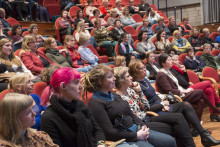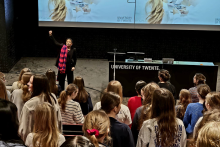‘FFNT is a bridge for communication between our members and the UT management. We make sure that the women’s voice is heard,’ agree FFNT board members Vanessa Magnanimo (Associate Professor, ET Faculty), Pilar Ruiz Ramiro (Assistant Professor, TNW Faculty) and Maya Daneva (Assistant Professor, EEMCS Faculty). The three scientists reflect on the role of FFNT and the network’s next steps.
Can you imagine the university without FFNT?
Magnanimo: ‘No, not anymore. It has such a strong role and we all have such strong motivation. It must be there.’
Ruiz Ramiro: ‘I can’t even imagine how difficult it was to get this started with so few women.’
Magnanimo: ‘Indeed, there were only eight female professors at the time FFNT was started. The female representation was really limited. In 2010, when I arrived here, there was only one female professor in my group.’
Ruiz Ramiro: ‘And that was 2010, not the 80’s!’
Daneva: ‘I came to the UT as part of a programme to get more women in computer science in 2005. There was only one female professor in the entire faculty. Women at the UT really wanted and needed to move forward at that time. FFNT was a long overdue initiative.’
Magnanimo: ‘It is scary because this was indeed only fifteen years ago. But instead of looking at it that way, we can choose to see the full part of the glass. There has been a huge increase: from 8% to 21% of female professors. There is still a long way to go, but things are changing.’
What do you consider FFNT’s biggest accomplishments?
Magnanimo: ‘The numbers, which we just mentioned, are of course important; but what is really changing and what is perhaps even more important is that our members now serve as role models. They are inspirations figures who can show that this can happen and that it is normal. That is because more people join us, but also because there is representation at all levels. We have female deans, female professors and so on. That is a big achievement of the recent years.’
Ruiz Ramiro: ‘I agree. Having role models is key. If we compare the situation nowadays to fifteen years ago, we are of course happier, but we want to reach the point when we don’t have to discuss the numbers of female academics but only focus on activities such as networking.’
Magnanimo: ‘I dream of times when FFNT is not useful anymore.’
Daneva: ‘Me too. That might happen when we reach 35% of women in any given area, but we are far from that point.’
Magnanimo: ‘There are two parts of the story: diversity and inclusion. A lot of efforts have been given to diversity. We have made progress, although it is not finished. If you are on committees, you can still notice certain bias but the awareness is much better. However, inclusion is still an issue and it is not so high on the agenda. But the two have to go together. We can get more people, but they also need to feel comfortable and supported here, otherwise they will leave.’
The FFNT board members during one of their latest meetings.
What is your goal for the future of FFNT?
Magnanimo: ‘To fire ourselves. Before that, we see that networking is the most appreciated aspect of our activities. At the same time, networking is often underestimated but if you share experiences it is important for you and everyone else. We realized this especially now during the corona crisis. We need to find new ways to empower networking and support our members in this difficult time. That is our short-term goal. Our mid-term goal is preparing a new strategy. We are now working with an expert to better understand our role within the UT. And our long-term goal is to fire ourselves.’
Daneva: ‘Our long-term goal is also that the UT becomes a preferred choice for female scientists, that it becomes the university where they feel best supported and where they can find the right balance.’
You mentioned the corona crisis, do you think that female academics are more impacted by it than their male colleagues?
Ruiz Ramiro: ‘I think the situation is of course challenging for everyone, but for women it can be more challenging because of their additional duties at home, such as childcare. I have read articles that showed these findings. On the other hand, the survey at the UT didn’t actually show great differences between men and women. That was surprising for us, but it suggests that sharing of tasks seems better divided here in Twente than elsewhere.’
What issues are female scientists facing? What issues do you still want to tackle?
Daneva: ‘One issue that we still see is transparency in the hiring process.’
Magnanimo: ‘And I’m always worried about what will happen now, after reaching the 20% of female full professors at the university. There has been a lot of initiatives to get more women and we have to be careful not to let this disappear. There is that danger.’
Ruiz Ramiro: ‘Yes, that is the danger. Also, we saw that – while the number of full professors grew a bit – the number of female associate professors went down. We need the focus on all levels. And most importantly, we want people to focus on gender diversity because they believe it is the right thing to do, not because they are trying to reach a certain number.’
15 years
FFNT was founded fifteen years ago with the objective ‘to create a network where academic women can meet and exchange ideas and experiences; to provide female faculty members with professional training; to advise the UT Management Board about female faculty issues; to raise awareness about female faculty issues (among both women and men); and to monitor the implementation of female faculty-friendly measures’.
FFNT was originally planning to celebrate its 15th birthday with a big international conference, just like it did for the first time 15 years ago. Due to the current situation, the event could not take place and the network decided to mark the occasion with a ‘Celebration Video’ featuring people who are important to FFNT.








